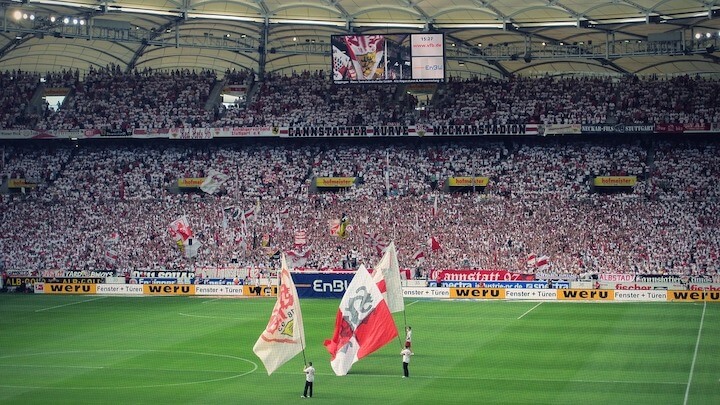Soccer Relegation and Promotion (Full Explanation)
For most soccer fans around the world, the system of relegation and promotion of clubs across various leagues is not foreign.
At least, not completely.
But just how much does this system affect the way soccer clubs are run?
And are there any genuine benefits to relegating and promoting clubs?
Let's takes an in-depth look at the topic and see how the system works in different areas across the world.
What is Relegation and Promotion in Soccer?
In a nutshell, the concept of relegation and promotion in soccer is...
A system in which teams move between leagues based on their performances over the course of a season.
Teams who finish near the bottom of the ladder, for example, may have to move to a lower division, while teams who finish at the top of the ladder get the opportunity to move up to a higher division.
Let’s take a look at a couple of examples…

The English Premier League and the EFL
The acclaimed “top-flight” division in England is the English Premier League which contains twenty clubs.
Below that is the “EFL” (the English Football League) which includes three divisions:
- The Championship
- League One
- League Two
Each of these divisions contains twenty four (24) clubs.
There are also many other divisions beneath the EFL with many clubs in participation.
As you go lower into the divisions at each level, each one covers a smaller and smaller geographical area.
Yet, the existence of a promotion and relegation system means that the smallest club in the lowest division could rise into the top tier -- at least theoretically.
In the top flight, three of the twenty clubs involved get relegated to the Championship at the end of each season.
These are the three teams that finish in the bottom of the division.
Since the English Premier League is the highest division of soccer in the country, there is no promotion.
The system of promotion begins to apply from the Championship level to the lowest division of the pyramid of leagues.
The relegation of three clubs from the Premier Division means that replacements will come in from the Championship.
The top two teams of the league season automatically get promoted while the third team is decided via a playoff system.
The playoff system involves a knockout competition between the teams that finished in the 3rd to 6th positions in the league.
The winner of this knockout competition grabs the third promotion ticket to the English Premier League.
The German Bundesliga and Bundesliga 2
These German leagues are set up in a different manner.
The bottom two teams in the Bundesliga get relegated to the Bundesliga 2.
On the other hand, the top two teams in the Bundesliga 2 get promoted to the Bundesliga.
A playoff match between the two third-place teams will decide the promotion - (Bundesliga's 3rd to the bottom, and Bundesliga 2's 3rd from the top)
This match is played across two legs with a “home” and “away” system.
If the Bundesliga 2 team wins, they get promoted at the expense of the Bundesliga team’s relegation.
If they don’t, both teams remain as they are.
An Exception - Major League Soccer (MLS)
There are a few countries that have not adopted the system of promotion and relegation of clubs in their leagues.
The highest-profile example of this is Major League Soccer - the top-tier division for soccer in the United States.
A brief overview of the way the MLS works shows that the league is a closed one.
This means that all MLS teams have a level of protection that ensures they cannot drop to the lower leagues.
This is so regardless of the position that they finish on the league table at the end of the season.
The league functions as a single entity structure that provides a “permanent” membership for the clubs in it.

Benefits of A Promotion / Relegation System
The system of promotion and relegation presents a dilemma for the clubs involved - albeit, a good one.
Some of these benefits include:
1. Fierce Competition For Places
It brings about a fierceness in competition between the clubs that are struggling to “avoid the drop”.
It also provides the same level of competitiveness between those that are fighting for the promotion.
The system helps keep managers, players, and club owners on their toes, making a conscious effort to keep the club well-run.
With the chance of relegation or promotion, the clubs involved know they cannot just sit back while getting paid.
2. Massive Growth Potential
It also presents the opportunity for a fairytale story where a team rises through the ranks of the lower divisions.
Eventually making its way to the highest division and fighting for its place there.
There have been such stories in recent history, with standout examples being Leicester City of England and RB Leipzig of Germany.
In 2011, Leicester City finished in 10th position in the English Championship.
A mere five years later, they were champions of the English Premier League.
This would never have been possible without a promotion/relegation system.
The story of RB Leipzig is perhaps even more impressive…
The club was founded in 2009 by very ambitious owners, and they started out in the fifth tier of German soccer, “NOFV-Oberliga Süd”.
A decade and four promotions later, they found themselves in the German Bundesliga.
Since then, the club has established itself as a mainstay in the top division, finishing as runners-up on a couple of occasions.
3. Increased Popularity
Promotion increases the reputation of a club in global soccer.
A team playing in the top division gains more exposure, more fans, and a bigger brand than if they were playing in a lower division
Promotion also comes with larger broadcasts, TV rights deals, bigger sponsorships, and generally a much better financial situation.
The higher the level of a division, the more money it generates and the more money the clubs involved get paid.
More money in the bank translates into better club administration and quality improvement - both short and long-term.
4. Higher-Level Talent
Promotion also attracts higher-level talent.
The best players want to play in the best leagues and get paid a matching salary.
To attract and be able to afford this caliber of player, every club needs the comfort in the knowledge that a promotion/relegation system is in place.
Conclusion
Without a doubt, the benefits of a promotion and relegation system far outweigh any cons.
Judging by the extensive adoption of the system across global soccer, it is safe to say that it is here to stay…
And that’s a good thing!

